How to make Kuli Kuli at home: A savory and nutritious recipe
Kuli Kuli is a popular snack in Nigeria, Benin, Ghana, and northern Cameroon. The refreshment is primarily made from peanuts, and the Dagbon people of Ghana and Nupe people of Nigeria were the first communities to make it. Other West African cultures learned from them and improved the recipe over time. This article explains how to make Kuli Kuli at home for personal consumption or sale.
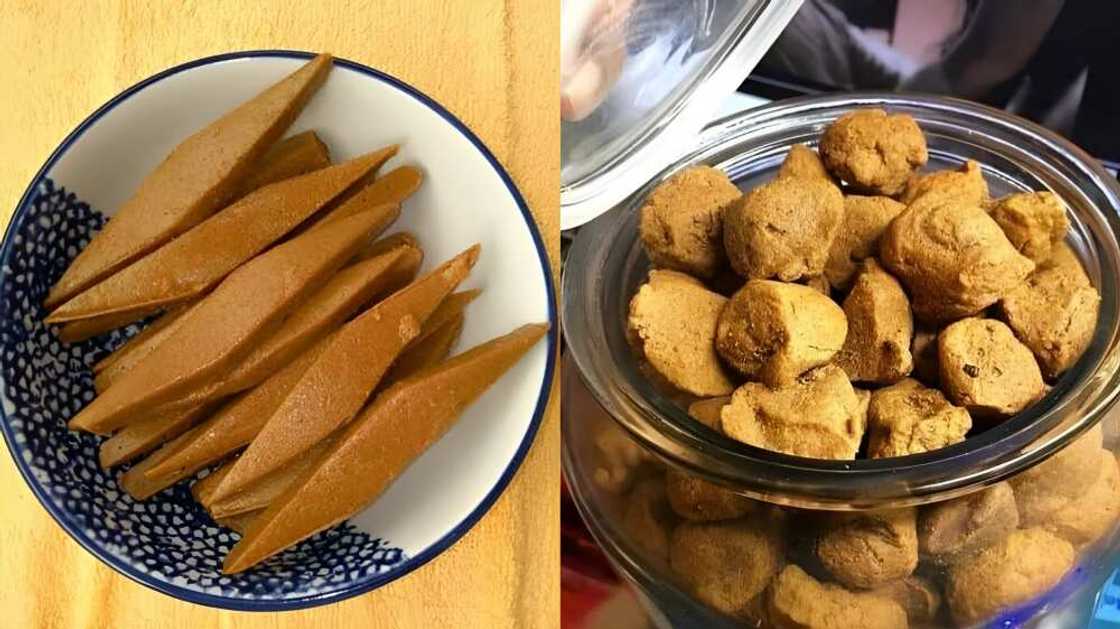
Source: UGC
Many premium hotels worldwide have Kuli Kuli on their snack menus. If huge hotels can do it, you can start a profitable Kuli Kuli hawking business or sell these snacks in your local restaurant. If you're wondering how to make this Nigerian snack, the following recipes will show you how:
How to make Kuli Kuli at home
You can have this delicious West African snack for breakfast or in between meals as a refreshment. There is nothing wrong with eating Kuli Kuli alone, but many are used to having the snack with a mixture of Garri, sugar, and water. Here is how to make Nigerian Kuli Kuli at home:

Read also
Accra to London by road: This is why the group didn't use made-in-Ghana Kantanka cars for historic trip
- Cooking time: 30 minutes
- Serving: 3 adults
Ingredients
- 4 cups of dry groundnuts
- 3 cups of clean sand
- A teaspoon of ground pepper
- Salt to taste
Cooking instructions
- Heat clean sand on a pan for 8 minutes.
- Add groundnuts and roast for 5 minutes.
- Remove them from the heat and allow them to cool for about 10 minutes.
- Remove the groundnut skin.
- Add the pepper and salt to the pealed groundnuts.
- Put everything in a kitchen grounding device and grind it into a paste.
- Remove from the grinder and knead with your hands for about 5 minutes.
- Sprinkle water at intervals while kneading.
- Put the paste on a cheesecloth, clean bandana, or jelly bag to sieve the water and squeeze out the oil.
- Place the paste on the pastry board, roll it with a rolling pin, then cut it into pieces.
- Heat the groundnut oil you squeezed from the paste on a pan (under low heat) for about 3 minutes.
- Fry the Kuli Kuli pieces for 8 minutes.
- Allow the snack to cool before serving.
How to make Kuli Kuli for sale

Source: UGC
Kuli Kuli snack is a profitable street snack in West Africa. More people want healthier snacks, and Kuli Kuli is one of their best options. So, if you desire to start a Kuli Kuli business, learning how to make spicy Kuli Kuli is the right step to take. The following recipe will teach you how to cook this snack:
- Preparation time: 30 minutes
- Cooking time: 30 minutes
- Total time: 1 hour
- Serving: 1 adult
Ingredients
- A cup of groundnuts (peeled, roasted, and salted)
- A teaspoon of ground pepper
- A teaspoon of ginger powder
- ½ cup of groundnut oil
Cooking instructions
- Grind the roasted groundnuts into a paste.
- Add ground pepper and ginger powder and mix into a paste.
- Put the paste on a cheesecloth, clean bandana, or jelly bag, and squeeze out the oil.
- Divide the paste into portions and mold each into a ball (or whatever shape you like).
- Preheat the groundnut oil on a pan under low heat for about 3 minutes.
- Fry the balls in hot groundnut oil for a minute or two.
- Remove the balls from the oil and allow them to cool completely before serving.
How to make Kuli Kuli with sugar
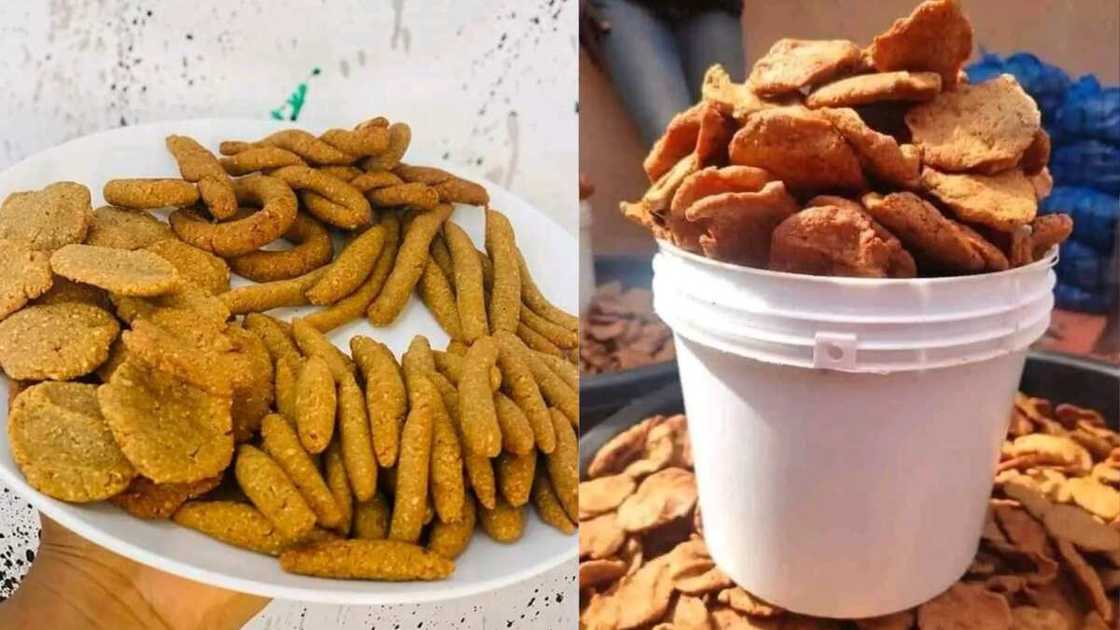
Source: UGC
Kuli Kuli with sugar is a yummy treat for children and adults. Ghanaians call it a Katty Cake (groundnut cake), while Nigerians call it Sisipelebe (street sweets). You can learn how to make groundnut cake the West African way from the following recipe:
- Cooking time: 30 minutes
- Serving: 3 adults
Ingredients
- 3 cups of groundnuts (roasted, peeled, and partially crushed)
- A cup of sugar
- A cup of water
Cooking instructions
- Pour water into a saucepan and add sugar.
- Boil the sugar solution until most of the water evaporates.
- Pour the groundnuts into the sticky golden brown sugar solution.
- Stir everything quickly and pour on a greased baking sheet (or a grinding board).
- Use a greased rolling pin to roll the hot mixture on a baking sheet and cut it into small pieces of your desired shape and size.
- Leave the Kuli Kuli balls on the board to cool before serving.
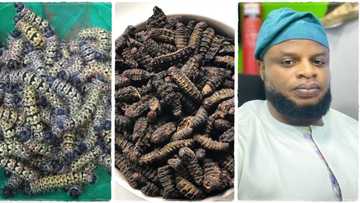
Read also
"Very delicious": Nigerian man harvests edible larvae from shea tree, posts photos of delicacy on Twitter
How to make spicy Kuli Kuli
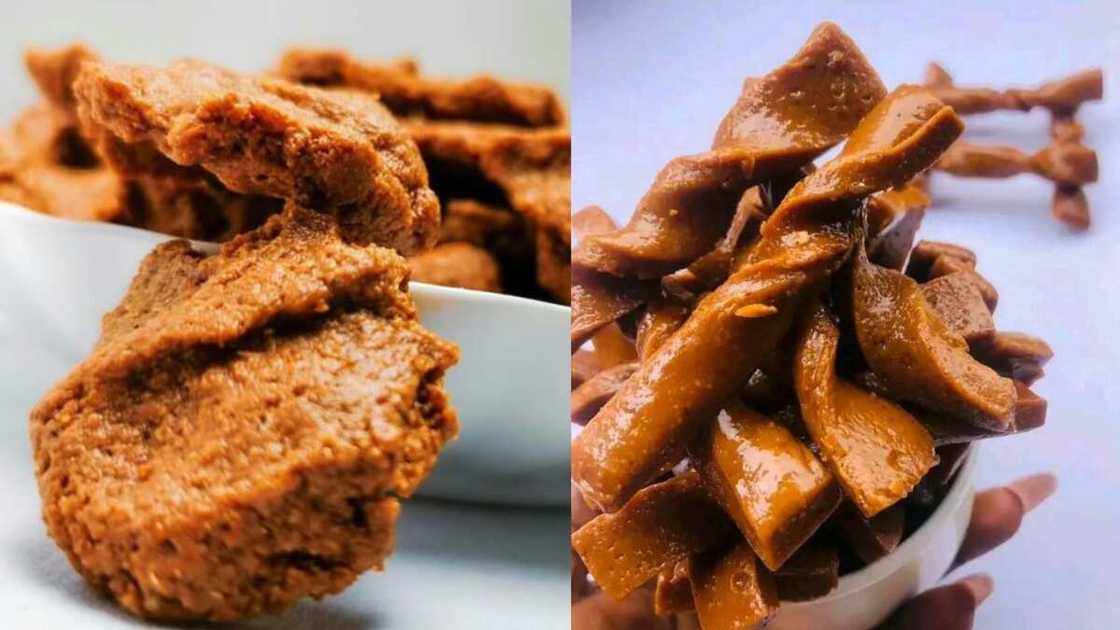
Source: UGC
Ghanaians eat spicy Kuli Kuli with Koko or Fura. Koko is a spicy porridge made from fermented corn flour, while Fura is a thick Ghanaian drink made from millet flour. If you want to make spicy Kuli Kuli, the following recipe will help you:
- Preparation time: 30 minutes
- Cooking time: 30 minutes
- Total time: 1 hour
Ingredients
- A cup of peanuts (salted and dry-roasted)
- ¼ teaspoon ground chili pepper
- A tablespoon of grated fresh ginger
- A cup of peanut oil (for frying)
Cooking instructions
- Grind the peanuts and ginger together until you get a smooth paste.
- Put ground chili pepper into the paste and mix well.
- Add two tablespoons of water to the dough and mix if it does not smoothen easily.
- Put the paste on a cheesecloth, clean bandana, or jelly bag, and squeeze out the oil.
- Divide the Kuli Kuli paste into pieces of your desired sizes and shape.
- Heat peanut oil in a pan and fry the Kuli Kuli over medium heat until golden brown.
- Drain excess oil on paper towels and serve when hot or cold.

Read also
Cee C and Alex, Ike and Mercy, other BBNaija All Stars housemates who have pending scores to settle
Some West Africans add crushed Kuli Kuli to vegetable salads, while others add it to a spicy meat dish called Suya (Chinchinga or Tsitsinga) to add taste and crunchiness. Moreover, you can add it to your beef, goat, or chicken stew.
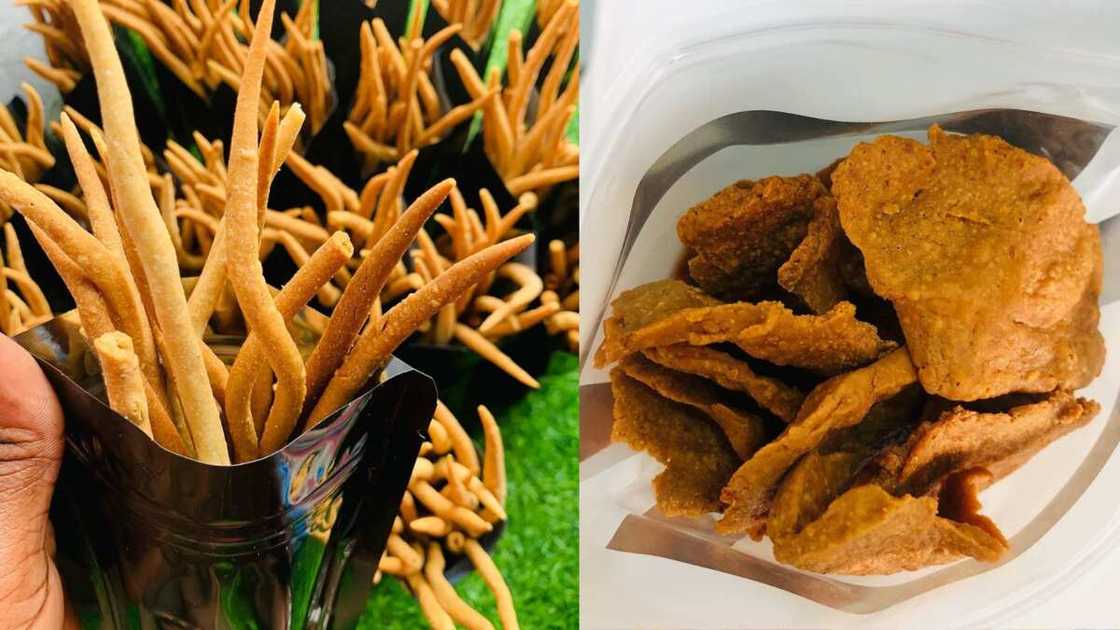
Source: UGC
What is Kuli Kuli?
Kuli Kuli is a West African snack primarily made from peanuts or groundnuts.
What is Kuli Kuli made from?
Most West African communities use groundnuts, onions, pepper, and ginger powder to prepare Kuli Kuli.
Is Kuli Kuli a healthy snack?
Kuli Kuli's nutritional benefits come from its ingredients — groundnuts, onions, pepper, and ginger powder. Groundnuts have protein, pepper benefits the heart and the digestive system, onions have anti-inflammatory and antioxidant properties, and ginger powder lowers nausea and blood sugar levels.
What does Kuli Kuli give to the body?
Kuli Kuli contains vitamins A, E, C, B6, and B12, which boost your body's immunity against diseases.

Read also
"You guys should wait for me": Photos, videos emerge as bold youths travel to London by car, stop in desert
What do we call Kuli Kuli in English?
Kuli Kuli is called peanut or groundnut cake in English.
Is groundnut cake a Kuli Kuli?
The West African Kuli Kuli is a peanut or groundnut cake.
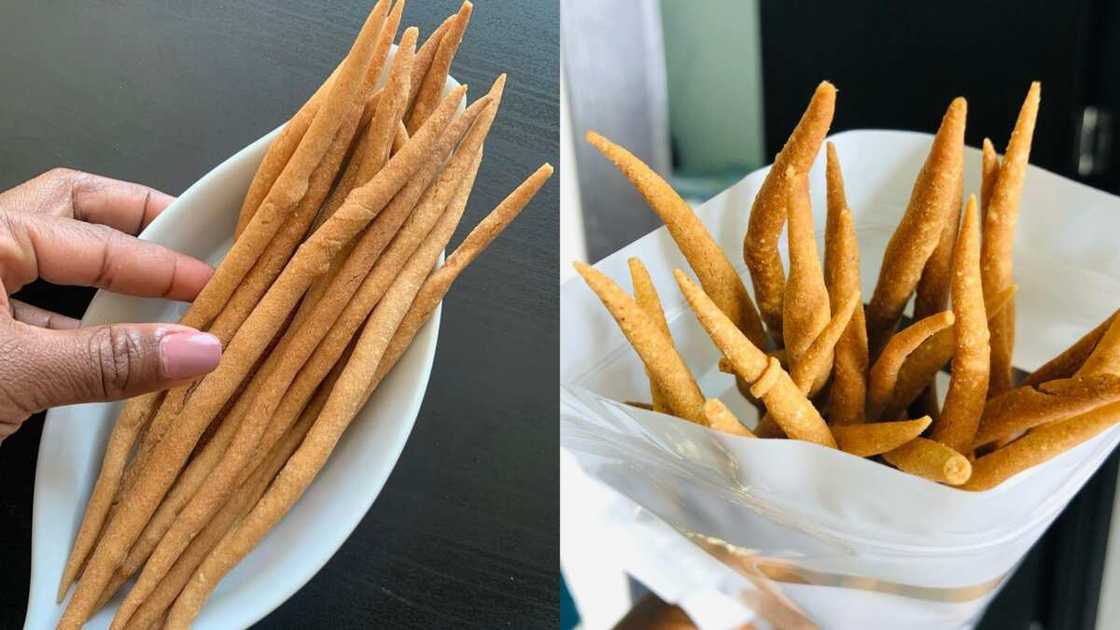
Source: UGC
Is Kuli Kuli spicy?
West African Kuli Kuli snacks are salty, spicy, and crunchy, and you can substitute salt with sugar while cooking to give them a sweet taste.
How do you preserve Kuli Kuli?
Kuli Kuli snacks can last up to a year when stored in airtight containers in cool, dry places. Keeping them well also maintain their fresh taste and scent.
Kuli Kuli is among West Africa's must-try snacks for the region's visitors. In countries like Nigeria and Ghana, parents usually give this spicy groundnut cake to children as a treat, and hawkers sell it in taxis and bus parks to travellers.
Legit.ng also explained how to make vegetable salad at home for weight loss. Eating salads daily can help you develop a healthy lifestyle that promotes weight loss over time.
Vegetables, fruits, and nuts have low calories and a high volume of fiber. The fiber makes you feel full longer and prevents constipation.
Source: Legit.ng

Peris Walubengo (Lifestyle writer) Peris Walubengo is a content creator with 3 years of experience in writing informational and entertainment articles, researching, editing, and proofreading. She has a Bachelor of Commerce & IT from the University of Nairobi (class of 2019). She joined Legit.ng in April 2022. She covers bios, marketing & finance, tech, fashion & beauty, recipes, movies and video game reviews, culture & traveling. In 2023, Peris finished the AFP course on Digital Investigation Techniques. Email: perisrodah254@gmail.com.

Adrianna Simwa (Lifestyle writer) Adrianna Simwa is a content writer at Legit.ng where she has worked since mid-2022. She has written for many periodicals on a variety of subjects, including news, celebrities, and lifestyle, for more than three years. She has worked for The Hoth, The Standard Group and Triple P Media. Adrianna graduated from Nairobi University with a Bachelor of Fine Arts (BFA) in 2020. In 2023, Simwa finished the AFP course on Digital Investigation Techniques. You can reach her through her email: adriannasimwa@gmail.com



